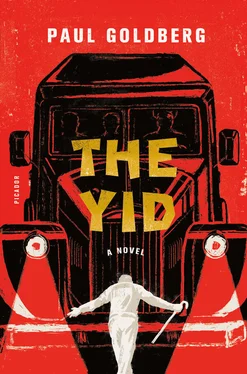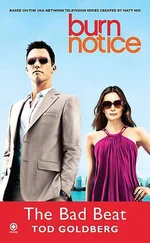Of course, Kogan’s focus on felling trees in the forests that once gave him shelter is a mild form of denial. A public trial, a beaten-out confession, and execution in a Lubyanka cellar are a more likely outcome.
* * *
The time has budged. Kogan feels the second hand move haltingly toward 4:40. Another knock.
He gets out of bed, slips a robe over his striped pajamas, and puts on his slippers, realizing that this is the last time he will be allowed such luxuries. He walks up to the window first. Looking down, he sees the top of a Black Maria beneath a dim streetlight seven stories below.
“Should I jump? Does primum non nocere apply to my beloved self?”
No, jumps are melodramatic.
Kogan needs no spectators.
He opens the doctor’s bag, which he keeps on the bookcase, right in the middle, next to the anatomy volumes and the Dahl Explanatory Dictionary of the Living Great Russian Language .
Another knock, as time moves forth and as oblivion nears.
Kogan quickly opens the small stainless-steel case used to sterilize the syringe. He assembles the syringe, connecting the sixteen-gauge needle and inserting the plunger. Quickly, as he breaks the ampule, he looks around the apartment, pushes the plunger to squeeze out the extra air, finds the vein in his left forearm, and inserts the needle.
What are Dr. Kogan’s thoughts? Is he thinking of the revolution, his comrades in the guerrilla band, the enemy boys he mowed down beneath the Ural hills? And what about the war where his mission was to heal? Is Kogan visualizing the mountain of mangled limbs he had to amputate to save the soldiers’ lives? Is Kafka on his mind? Are poetry’s verbal pirouettes of any comfort?
His thoughts are in a massive vat, a very real vat, filled with formaldehyde. Inside are severed parts of unclaimed bodies taken from the morgues to train his students to dissect. He first encountered those floating limbs and torsos in the twenties, when his excitement about acquiring lifesaving skills and fear of professors didn’t let him take a pause and think of dignity in death.
He saw enough of that, and life which he desired he’d build anew. These severed parts didn’t torment him when he taught. You need cadavers if you are to learn to heal. This changed in June of 1952. With weeks to go before the loss of everything he worked for, Aleksandr Sergeyevich Kogan thought he saw his own face on a severed head that stared at him from inside the vat.
The eyes weren’t vacant. Kogan thought he saw them blink.
* * *
Another knock, then another. It’s their play, they get to write it.
“I will withhold participation in the only way open to me. No, I will not give them the satisfaction of participation in public spectacles. I will not betray innocent colleagues at Pervaya Gradskaya.
“Do I say something? Do I look around for the last time? No, no time, no thoughts, a quick exit. I give the plunger a quick push. If the pain is intense, it’s really potassium. The burning sensation is indeed intense. They will be breaking the door about now.
“Of course, it’s potassium. What else can it be? Next, a quick, hard push on the plunger will stop the heart.”
“Otkroy zhe nakonetz, yob tvoyu mat’.” Kogan hears a familiar voice, pleading in Russian. Open the door at last, fuck your mother.
“Potz,” says Kogan in Yiddish, pulling the needle out of the vein. Prick.
* * *
Kogan opens the door and, instead of the Angel of Death, Komandir Levinson walks in in all his tall, stooped, gangly splendor.
He is wearing an ill-fitting, bloodstained uniform of an MVD lieutenant. With him none other than Friederich Robertovich Lewis, in the uniform of a private — except, of course, his face is now painted white. The poor devil looks like a cadaver.
No scenario Kogan can imagine includes seeing Levinson’s stooped frame in the blood-soaked tunic of an MVD lieutenant.
Squinting at the hallway lights, Kogan says in Yiddish: “Dos bist du.” So it’s you.
Suddenly, a wave of laughter erupts deep within his gut.
“We need your dacha,” whispers Levinson as he and Lewis step into the apartment.
“Akh ty yob tvoyu mat’,” says Kogan, through spasms of dull, deep, nearly silent laughter. Fuck your mother.
“You’d better button your overcoat, Comrade Komandir, ” he adds. “Have you slit someone’s throat again?”
Levinson nods. “They came for me.”
So he did it, fought back. One should never underestimate the power of a stubborn son of a bitch.
“How many?”
“Three.”
“And the corpses, where are they?”
Levinson points downstairs, toward the courtyard.
“Is Dusya here?”
“I convinced her to leave me. What do you intend to do with the bodies?”
“Dacha,” says Levinson, extending his hand for the keys.
“I think I might as well come with you,” says Kogan. “I have a week. Fresh air will do me good.”
At 5:07 a.m., Levinson opens the back door of the Black Maria. “You will be traveling in the cage.”
After Kogan climbs into the cage, Lewis gets behind the wheel and Levinson in the passenger’s seat.
“I hope you don’t mind the company, Professor Kogan,” says Levinson, looking back through the bars as Kogan eases into the seat above the corpses.
“I do, to be honest. But it’s good practice.”
* * *
“Comrade Lewis!” Levinson calls out as the Black Maria passes by the Kazan Railroad Station.
“Present, komandir ,” says Lewis, not looking up. The familiarity in his response verges on mockery.
LEVINSON: Comrade Lewis, what have you learned about our country over these past twenty-two years?
LEWIS: You are drunkards, brutes, barbarians. You have an exaggerated sense of duty and honor, which makes you reliable, and you are prone to messianic delusions, which makes you insufferable. Most of you cannot be counted among inhabitants of the world of real things. Am I missing anything?
LEVINSON: Where do I fit into this?
LEWIS: Not a drunkard, but the other things — yes.
KOGAN: I second that, Solomon. These comrades, whom you have offed, would concur also. Half of me wishes I saw that, the other half is glad I didn’t.
LEVINSON: I was speaking with Lewis. What have you learned specifically about our peculiar traditions of law enforcement, Comrade Lewis?
LEWIS: Law enforcement? Do you have that? Do you even have a genuine police function?
LEVINSON: Continue, Comrade Lewis, you are making a valuable point. What do we have instead of the police?
LEWIS: Do you have anything but terror?
LEVINSON: Excellent! Look at what we’ve done so far. I killed three MGB operatives. That’s three armed men. It was so easy. I am surprised it’s not done more often. We threw the corpses in the back of their Black Maria and drove through the center of Moscow, running every red light. We showed the MGB the corpses of their colleagues. And you, Comrade Lewis, were in whiteface through much of the operation. A badly done whiteface, at that.
LEWIS: Your point, komandir ?
LEVINSON: I am not as far as the point, Comrade Lewis. Patience, please. Only questions for now. Here is another: In our country, what will happen if someone decides to break every law in the most flagrant ways imaginable? Comrade Kogan, would you like to answer this?
KOGAN: He will get far.
LEVINSON: I am still doing questions. Here is one more: What if, instead of resting on our laurels or crawling into a hole, we take this as far as we can?
LEWIS: Am I starting to hear a plan?
LEVINSON: I have been looking at our situation this way and that, and I see no way we can survive for more than a couple of weeks if things are left as they are. Even as stupid as they are, they will find us.
Читать дальше












